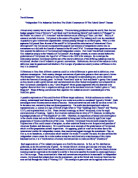The audience get their first sight of the huge Roman army with a long panning shot. It is a typical battle scene with its blue and other cold colours. Reflecting the mood of the soldiers. Maximus walks along a line of men, every soldier salutes him or shows some sort of loyalty. There is also music in the background, violins and Lisa Gerrard’s droning, will touch the audience. He then mounts his horse and rides to meet the other cavalry, followed faithfully by his dog. The dog could represent his men who will follow him anywhere. Maximus enters the forest the camera pans from a close up of him to the dozen or so cavalry. Then a mid shot while Maximus gives a speech, in the speech he mentions the Elysium, the audience will probably not link it with the establishing shot straight away but will realise later in the film.
The battle scene starts the special effects of fire balls are defiantly emphasized but this a good start to a bloody scene and also shows how much stronger the Romans are compared with the Germanians (now Austrians). The cavalry ride with Maximus and his dog through the forest with an excellent fast panning shot keeping up with the horses, some trees are in between the camera and horses, this gives a stronger feeling of speed as the trees rush past quicker. When the cavalry hits the battle you can distinctly hear the sound of swords meeting and arrows whistling past, the sound works well to focus your attention on the battle. The camera shows many different soldiers losing and winning their personal fights, to Maximus killing many men easily. Then the direct sound fades out and dubbed over with asynchronous music. This works well with the slo-mo editing which gives the audience the sense of passing time and a dragged out battle. As an opening sequence this is well shot and edited it grabs the audiences attention and starts building characters, you also know who’s side your on straight away. It is also designed to tie well with the end.
The final sequences= starts when Maximus and Commodus accompanied by Commodus’ guard led by Quintus Maximus’ old right hand man, are on the lift. The bright white sunlight streaming in down the lift shaft helps draw in the audience and create an atmosphere. There is an irony that Maximus wears black while Commodus wears white trying to propose himself as the good but really Maximus is the good people’s man. It is people that kept Maximus alive, Commodus has wanted him dead through the whole film, it could be a subtext about politicians and how they put a front to satisfy the public. There is a depressing slow music as the soldiers ring around Maximus and Commodus to make an inner stadium. This is quite different from other films as they’re end battles have fast intense music. This conceals who is going to win.
There is a good pan around the stadium showing the films excellent CGI reconstruction of the Colleseum and then a high shot of the ring of soldiers who don’t all fit in the frame. Through the whole sequence there is a bright natural light apart from the end. A mid shot of Quintus shows he is thinking about something. Is it whose side he’s on? Also it shows he is in similar dress to Maximus. Commodus makes the first move in the forty odd piece long sword fight. There is a lot of good editing for instance when Maximus knocks Commodus down it is in slo-mo this tells the audience that it a strong move. Later the two clasp together. There is a quiet gong that could subconsciously grab the audience a close up of each shows their facial expression, Commodus looks surprised and Maximus tired. Commodus loses his sword and when he tries to take one from Quintus, Quintus will not give it him and orders the other soldiers to seize theirs. Maximus drops his as he gives up thinking his job is over, but then Commodus gets a hidden knife from his sleeve and attacks Maximus, the motions are fast but seem slow. Maximus seems possessed; he fights too well for some one who is nearly dead. Once Commodus is dead Maximus slips into his Elysium, it is well edited as his hand moves into it and reaches for a door. He is then woken again by Quintus, the camera shows his weariness with a mid shot. Maximus tells Quintus the previous emperor Marcus Orailius’ wishes. Then drops to the floor. Lucilla rushes to him over the red petals, which are a mise-en-scene for the blood and also red is a lucky colour. Lucilla tells Maximus to go to his family while the camera looks at her and then reverses to Maximus whose eyes close. We see his Elysium, which is now in a blue colour because he is dead, but his family are in a gold light. Quintus and other people who respect Maximus carry him away. And the next scene is Juba burying some dolls of Maximus’ family with him. A close up of the dolls and the Juba is the shot that will stick in the memory of the audience but the actual ending is the sun fading over the horizon.
The closing sequence is well planned and brings the film to a good end. Overall the film is very good but with some unbelievable parts. The storyline hides the fact that none of the actors cover their accents.







